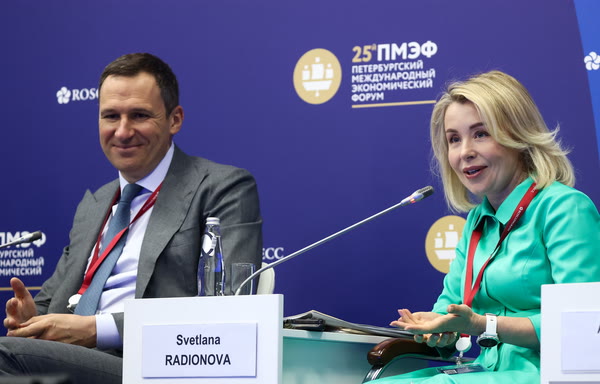
The Circular Economy and the Environment
Key conclusions
There are Regional Operators All Across Russia, and State Support Should Attract Investors to the Industry
“An institution has been established for regional operators and now stretches across the entire country. Every constituent entity is undergoing reform. As for regional operators: there are 181 of them, they are sustainable, and there are only maybe five regional operators in the ‘red zone’ with problems. Work is developing with processing and sorting. [...] Recycling is developing at a much slower pace. [...] At the moment, we have an opportunity to leverage RUB 100 billion from the market, to lend it out at a subsidised key rate with a price tag of around 4–5% per annum. Given recent economic developments, such affordable financial resources are unprecedented. This kind of money has never been offered to the industry in such quantities before,” Denis Butsayev, General Director, Russian Environmental Operator Public Law Company.
“Approximately 20 modern facilities have already been built. Under the first scenario, if we’re talking about large plants, there should be 250 across the Russian Federation, and as for waste management, there should be about 800 facilities. [...] We see great potential in composting and fuel production,” Aleksandr Kogan, Deputy Chairman of the Committee of the State Duma of the Federal Assembly of the Russian Federation on Ecology, Natural Resources and Environmental Protection.
PROBLEMS
An Abundance of Imported Waste Disposal Equipment and a Lack of Licensed Waste Management Facilities
“Import substitution related to the production of equipment and machinery for the industry is progressing well. [...] Things aren’t going quite as well with recycling – import substitution is up to 60% there. […] We will work to raise localization levels significantly by the end of the year and make those technologies that are not produced domestically available for alternative supplies from several sources and balance the risks with the non-cooperation we’ve run up against recently,” Denis Butsayev, General Director, Russian Environmental Operator Public Law Company.
“Individuals claiming to be recyclers, creating something new, engaging in activity and creating a new product, need to follow through, and if they don’t, they should put their licences away and stop creating the illusion of being a specialized market player. [...] We’ve got this paradoxical situation where the state is moving faster than business, and business is dragging its heels,” Svetlana Radionova, Head, Federal Service for Supervision of Natural Resources.
No Legal Basis for Including Investment in the Tariff
“We still haven’t got any legally binding documents – for regional operators or professional market participants. We’ve still got problems with setting the investment component of the tariff. Work getting the territory ready to start building infrastructure is taking a long time. Most of the constituent entities lack actual land plots, and if they do have them, they are nominal plots, which take a long time to prepare for the investment cycle. All this prolongs the possibilities for investment projects,” Denis Butsayev, General Director, Russian Environmental Operator Public Law Company.
Regional Administration Slows SMW reform
“The regions need to start moving towards bringing together the necessary structure. The form can vary, but it has to allow for money to be raised that can be repaid, for an investor and a commitment on the part of the region to the additional financial burden that will entail the implementation of the investment project. Unfortunately, we have to be prepared for this and do what we can to reduce the burden. [...] There’s a lot of interest from investors in the industry, but when an investor comes to the region, it all comes down to the regional administration,” Denis Butsayev, General Director, Russian Environmental Operator Public Law Company.
SOLUTIONS
Regulatory Change and Incentives Through Support Measures
“We are changing the legal and regulatory framework in significant ways and using legislation and support measures to encourage regional teams to make decisions. We try to immerse the incentive approaches of the constituent entities into every support measure. [...] As part of the subsoil legislation, we have prepared a bill on replacement refuse stone. Waste from this industry is worth up to six billion roubles annually,” Dmitriy Tetenkin, Deputy Minister of Natural Resources and Environment of the Russian Federation.
“By 2030 [...], it’s in the bill, a ban will be placed on dumping secondary resources. [...] Another measure will encourage the reuse of the products. Beginning in March 2024, the government and the Ministry of Industry and Trade will define specific activities, a list of products that will be obliged to use secondary raw materials in production and a list of products that are difficult to recycle that will no longer be produced,” Aleksandr Kogan, Deputy Chairman of the Committee of the State Duma of the Federal Assembly of the Russian Federation on Ecology, Natural Resources and Environmental Protection.
Fostering Civic Awareness and Holding Offenders Accountable
“We aren’t spending any money to help the public understand the importance of the environment for future generations. [...] We’re getting rid of a huge number of unauthorised dumpsites, approximately a thousand every year – and people just throw the rubbish into their neighbour’s yard or dump it in the forest. We have to work together to foster a sense of civic awareness,” Andrey Betin, Deputy Governor of the Nizhny Novgorod Region.
“I believe that one of the main obstacles standing in the way of a closed-loop economy is that it was in the black zone before, and now, thanks to the work of the government, we’ve started to move into this grey zone, but we’re still far from having achieved our goals. [...] We have to introduce criminal liability for offenders,” Andrey Lugovoi, First Deputy Chairman of the Committee of the State Duma of the Federal Assembly of the Russian Federation on Security and Anti-Corruption.
For more details, see the ROSCONGRESS.ORG Information and Analytical System.








